2019
Wednesday, 1/30, 2019: Hurricane Harvey, Research, and Oral History by Dr. Todd Romero (UH)
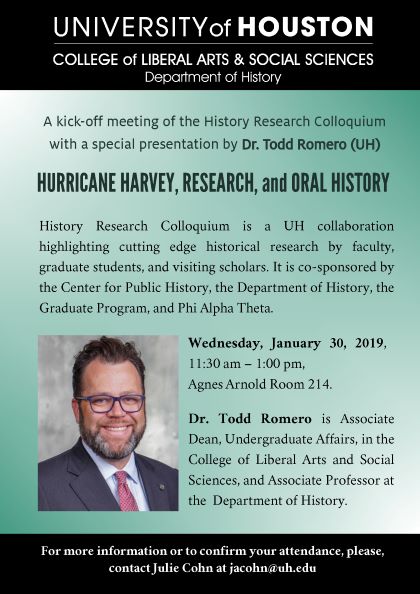 Join us for the kick-off meeting of the History Research Colloquium, a UH collaboration highlighting cutting edge historical research by faculty, graduate students, and visiting scholars. It is co-sponsored by the Center for Public History, the Department of History, the Graduate Program, and Phi Alpha Theta. The meeting will have a special Presentation by Dr. Todd Romero on "Hurricane Harvey, Research, and Oral History."
Join us for the kick-off meeting of the History Research Colloquium, a UH collaboration highlighting cutting edge historical research by faculty, graduate students, and visiting scholars. It is co-sponsored by the Center for Public History, the Department of History, the Graduate Program, and Phi Alpha Theta. The meeting will have a special Presentation by Dr. Todd Romero on "Hurricane Harvey, Research, and Oral History."
Wednesday, January 30, 2019
11:30 am - 1:00 pm
Agnes Arnold Room 214
For more information or to confirm your attendance, please contact Julie Cohn at jacohn@uh.edu.
Friday, 2/15, 2019: Morocco through the Film Maker's Lens
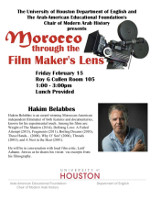 The UH Department of English and the Arab-American Educational Foundation's Chair of Modern Arab History present a conversation between Hakim Belabbes, an award-winning Moroccan-American independent filmmaker, and Latif Adnane, a local flim critic.
The UH Department of English and the Arab-American Educational Foundation's Chair of Modern Arab History present a conversation between Hakim Belabbes, an award-winning Moroccan-American independent filmmaker, and Latif Adnane, a local flim critic.
Friday, February 15, 2019
1:00 - 3:00 pm
Roy G. Cullen Building, Room 105
Lunch will be provided
Tuesday, 2/19, 2019: The Early History of the Arab-American Community by Dr. Akram Khater (North Carolina State University)
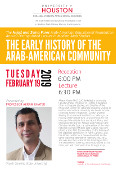 The College of Liberal Arts and Social Sciences & The Arab-American Education Foundation Chair in Modern Arab History invite you to the Nijad and Zeina Fares Arab-American Educational Foundation Annual Distinguished Lecture in Modern Arab Studies on "The Early History of the Arab-American Community" by Dr. Akram Khater (North Carolina State University).
The College of Liberal Arts and Social Sciences & The Arab-American Education Foundation Chair in Modern Arab History invite you to the Nijad and Zeina Fares Arab-American Educational Foundation Annual Distinguished Lecture in Modern Arab Studies on "The Early History of the Arab-American Community" by Dr. Akram Khater (North Carolina State University).
Akram Khater Ph.D. (UC Berkeley) is University Faculty Scholar, Professor of History, Khayrallah Chair in Diaspora Studies, and Director of the Khayrallah Center for Lebanese Diaspora Studies at North Carolina State University. His books include Inventing Home: Emigration, Gender and the Making of a Lebanese Middle Class, 1861-1921; A History of the Middle East: A Sourcebook for the History of the Middle East and North Africa; and Embracing the Divine: Passion and Politics in the Christian Middle East. He is the editor of the International Journal of Middle East Studies, has completed a 2012 PBS documentary on the history of the Lebanese community in North Carolina, was the senior curator for a museum exhibit on the same topic that opened on February 21, 2014, and was also the curator of the traveling exhibit, The Lebanese in America, which has toured six US cities, and will continue to tour through 2019.
Tuesday, February 19, 2019
Reception: 6:00 pm
Lecture: 6:30 pm
Hilton University of Houston, Waldorf-Astoria Ballroom
(4800 Calhoun, Houston TX 77004)
Thursday, 2/21, 2019: Digitizing Archives in Russia: Epistemic Sovereignty and Its Challenges in the Digital Age by Dr. Alexey Golubev (UH)
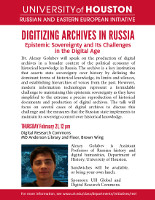 Dr. Golubev will discuss the production of digital archives in a broader context of the political economy of historical knowledge in Russia. The archive is a key institution that asserts state sovereignty over history. It defines the dominant forms of historical knowledge, its limits and silences, establishes hierarchies of voices from the past, and produces experts with authority to interpret its documents. However, modern information and communication technologies represent a formidable challenge to maintaining this epistemic sovereignty as they have simplified to the extreme a precise reproduction of historical documents and production of digital archives. This paper will focus on several cases of digital archives to discuss this challenge and the measures that the Russian state implements to maintain its sovereign control over historical knowledge.
Dr. Golubev will discuss the production of digital archives in a broader context of the political economy of historical knowledge in Russia. The archive is a key institution that asserts state sovereignty over history. It defines the dominant forms of historical knowledge, its limits and silences, establishes hierarchies of voices from the past, and produces experts with authority to interpret its documents. However, modern information and communication technologies represent a formidable challenge to maintaining this epistemic sovereignty as they have simplified to the extreme a precise reproduction of historical documents and production of digital archives. This paper will focus on several cases of digital archives to discuss this challenge and the measures that the Russian state implements to maintain its sovereign control over historical knowledge.
Thursday, February 21, 2019
12:00-1:30 pm
Digital Research Commons (MD Anderson Library 2nd Floor, Brown Wing, map).
Friday, 2/22, 2019: Myths, Memes, and #MeToo: Ancient Sexual Assault in the Modern World by Darah Vann (UH)
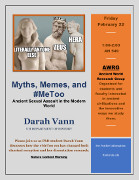 Please join the Ancient World Research Group as PhD student Darah Vann discusses how the #MeToo era has changed both classical reception and her dissertation research.
Please join the Ancient World Research Group as PhD student Darah Vann discusses how the #MeToo era has changed both classical reception and her dissertation research.
The Ancient World Research Group is organized for students and faculty interested in ancient civilizations and the innovative ways we study them.
Friday, February 22, 2019
1:00 - 2:00 pm
Agnes Arnold Room 549
For further information: fholt@uh.edu
Wednesday, 2/27, 2019: Slavery By Another Name: A discussion on Convict Leasing and the “Sugar Land 95”
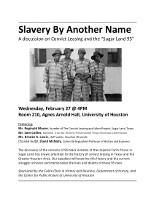 The discovery of the remains of 95 black inmates at the Imperial Farm Prison in Sugar Land has drawn attention to the history of convict leasing in Texas and the Greater Houston Area. Our speakers will examine this history and the current struggle to honor and memorialize the lives and deaths of these 95 men.
The discovery of the remains of 95 black inmates at the Imperial Farm Prison in Sugar Land has drawn attention to the history of convict leasing in Texas and the Greater Houston Area. Our speakers will examine this history and the current struggle to honor and memorialize the lives and deaths of these 95 men.
Join us for a panel discussion featuring Mr. Reginald Moore, founder of The Convict Leasing and Labor Project, Sugar Land, Texas; Mr. Sam Collins, National Trust for Historic Preservation Texas Historical Commission; and Ms. Brooke A. Lewis, staff writer, Houston Chronicle.
Chaired by Dr. David McNally, Cullen Distinguished Professor of History and Business
Wednesday, February 27, 2019
4:00-6:00 pm
Agnes Arnold Room 210
Tuesday, 3/5, 2019: Sugar Land History and the Lost 95 African Americans
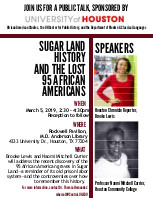 Come join the UH Center for Public History, African American Studies, and the Department of Modern & Classical Languages on March 5th for a special talk by Brooke Lewis (Houston Chronicle) and Naomi Mitchell Carrier (Houston Community College) addressing the recent discovery of the 95 African American graves in Sugar Land—a reminder of its old prison labor system—and the controversies over how to remember this history.
Come join the UH Center for Public History, African American Studies, and the Department of Modern & Classical Languages on March 5th for a special talk by Brooke Lewis (Houston Chronicle) and Naomi Mitchell Carrier (Houston Community College) addressing the recent discovery of the 95 African American graves in Sugar Land—a reminder of its old prison labor system—and the controversies over how to remember this history.
Tuesday, March 5, 2019
2:30-4:30 pm
Rockwell Pavilion, M.D. Anderson Library (4333 University Dr.)
Wednesday, 3/6, 2019: Rise of the Chongas: How Loud and Lipsticked Cubanitas Burned their Community’s Racial, Sexual, and Class-Based Pedestal to the Ground by Paula Davis Hoffman (UH)
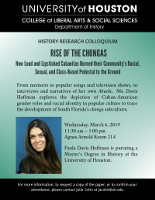 From memoirs to popular songs and television shows, to interviews and narratives of her own Abuela, Ms. Davis Hoffman explores the depiction of Cuban-American gender roles and racial identity in popular culture to trace the development of South Florida’s chonga subculture.
From memoirs to popular songs and television shows, to interviews and narratives of her own Abuela, Ms. Davis Hoffman explores the depiction of Cuban-American gender roles and racial identity in popular culture to trace the development of South Florida’s chonga subculture.
Wednesday, March 6, 2019
11:30 am - 1:00 pm
Agnes Arnold Hall Room 214
Thursday, 3/7, 2019: Different Shades of Yellow: Sinophobic Discourses in San Francisco, Singapore and Vladivostok, 1880s-1930s by Dr. Sören Urbansky (German Historical Institute, Washington, DC)
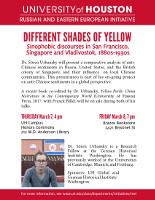 Dr. Urbansky will present a comparative analysis of anti-Chinese sentiments in Russia, United States, and the British colony of Singapore, and their influence on local Chinese communities. A recent book co-edited by Dr. Urbansky, Yellow Perils: China Narratives in the Contemporary World (University of Hawaii Press, 2017, with Franck Billé) will be on sale during the event.
Dr. Urbansky will present a comparative analysis of anti-Chinese sentiments in Russia, United States, and the British colony of Singapore, and their influence on local Chinese communities. A recent book co-edited by Dr. Urbansky, Yellow Perils: China Narratives in the Contemporary World (University of Hawaii Press, 2017, with Franck Billé) will be on sale during the event.
Thursday, March 7, 2019
4:00-6:00 pm
Honors Commons, 212 M.D. Anderson Library (4333 University Dr.)
Dr. Urbansky will also speak on Friday, March 8, 7:00–8:00 pm, at the Brazos Bookstore (event description)
Friday, 3/8, 2019: Viking Women Warriors and Gender Considerations in Archeology by Dr. Charlotte Hedenstierna-Jonson (German Historical Institute, Washington, DC)
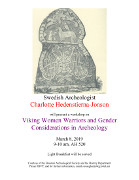 Dr. Charlotte Hedenstierna-Jonson has a PhD from the Archaeological Research Laboratory, Stockholm University. With a background in field archaeology and as senior curator at the Swedish History Museum (SHM), she has held research fellowships at SHM, Stockholm University and the Römisch-Germanisches Zentralmuseum (RGZM) in Mainz. Her previous research projects have focused on warfare, identities, mobility and material culture in Late Iron Age – Viking Age societies. Most recently, she has been part of the interdisciplinary ATLAS-project aiming at unraveling human prehistory within present day Sweden by combining archaeology, physical anthropology and genetics.
Dr. Charlotte Hedenstierna-Jonson has a PhD from the Archaeological Research Laboratory, Stockholm University. With a background in field archaeology and as senior curator at the Swedish History Museum (SHM), she has held research fellowships at SHM, Stockholm University and the Römisch-Germanisches Zentralmuseum (RGZM) in Mainz. Her previous research projects have focused on warfare, identities, mobility and material culture in Late Iron Age – Viking Age societies. Most recently, she has been part of the interdisciplinary ATLAS-project aiming at unraveling human prehistory within present day Sweden by combining archaeology, physical anthropology and genetics.
Friday, March 8, 2019
9:00-10:00 am
Agnes Arnold Room 520
Light Breakfast will be served
Courtesy of the Houston Archeological Society and the History Department
Please RSVP, and for further information, email snvaughn@sbcglobal.net
Tuesday, 3/19, 2019: A Poetics for the Empire: The Function of Poetry among the Ottoman Elite by Dr. Selim Kuru (University of Washington)
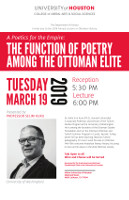 Dr. Selim Kuru (Ph.D., Harvard University) is Associate Professor and Director of the Turkish Studies Program at the University of Washington. He is among the founders of the Ottoman Studies Foundation and run the Intensive Ottoman and Turkish Summer Program in Cunda, Ayvalık, Turkey, where he has been teaching Ottoman Turkish paleography. Dr. Kuru’s work focuses on Ottoman 14th-16th centuries Anatolian literary history, focusing on love and its place in the elite Ottoman society.
Dr. Selim Kuru (Ph.D., Harvard University) is Associate Professor and Director of the Turkish Studies Program at the University of Washington. He is among the founders of the Ottoman Studies Foundation and run the Intensive Ottoman and Turkish Summer Program in Cunda, Ayvalık, Turkey, where he has been teaching Ottoman Turkish paleography. Dr. Kuru’s work focuses on Ottoman 14th-16th centuries Anatolian literary history, focusing on love and its place in the elite Ottoman society.
Tuesday, March 19, 2019
Reception: 5:30 PM
Lecture: 6:00 PM
Hilton University of Houston, Shamrok Room (4800 Calhoun, TX 77004)
Wednesday, 3/27, 2019: Transformations, Practices and Environmental Discourses, and Urbanization in the City of Mexico in the Nineteenth Century by Dr. Sergio Miranda Pacheco (Instituto de Investigaciones Históricas UNAM)
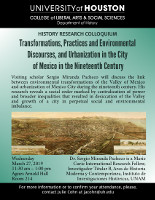 Dr. Sergio Miranda Pacheco, a visiting scholar at UH, will discuss the link between environmental transformations of the Valley of Mexico and urbanization of Mexico City during nineteenth century. His research reveals a social order marked by centralization of power and broader inequalities that resulted in desiccation of the Valley and growth of a city in perpetual social and environmental imbalance.
Dr. Sergio Miranda Pacheco, a visiting scholar at UH, will discuss the link between environmental transformations of the Valley of Mexico and urbanization of Mexico City during nineteenth century. His research reveals a social order marked by centralization of power and broader inequalities that resulted in desiccation of the Valley and growth of a city in perpetual social and environmental imbalance.
Wednesday, March 27, 2019
11:30 am - 1 pm
Agnes Arnold Room 214
Thursday, 3/28, 2019: History Career Day
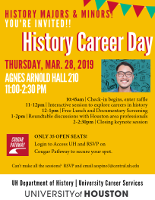 10:45 am: Chech-in begins, enter raffle
10:45 am: Chech-in begins, enter raffle
11 am - 12 pm: Interactive session to explore careers in history
12 - 1 pm: Free lunch and documentary screening
1 - 2 pm: Roundtable discussions with Houston area professionals
2 - 2:30 pm: Closing keynote session
Thursday, March 28, 2019
11:00 am - 2:30 pm
Agnes Arnold Room 210
Login to Access UH and RSVP on Cougar Pathway to secure your spot (only 35 open seats).
Thursday, 4/4, 2019: National Character and the Cuban Revolution by Dr. Louis A. Pérez, Jr. (University of North Carolina at Chapel Hill)
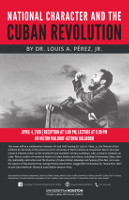 This event will be a collaboration between UH and UHD hosting Dr. Louis A. Pérez, Jr., the Director of the Institute for the Study of the Americas at the University of North Carolina at Chapel Hill. Pérez's principal research interests center on the nineteenth and twentieth-century Caribbean, with a research emphasis on Cuba. Pérez is author of numerous books on Cuban history and culture, including On Becoming Cuban: Identity, Nationality, and Culture and The Structure of Cuban History: Meanings and Purpose of the Past. He is also the winner of Elsa Gloveia Prize, George Perkins Marsh Prize, Guggenheim Fellowship for Humanities: Iberian and Latin American History & 2000 Bolton-Johnson Prize.
This event will be a collaboration between UH and UHD hosting Dr. Louis A. Pérez, Jr., the Director of the Institute for the Study of the Americas at the University of North Carolina at Chapel Hill. Pérez's principal research interests center on the nineteenth and twentieth-century Caribbean, with a research emphasis on Cuba. Pérez is author of numerous books on Cuban history and culture, including On Becoming Cuban: Identity, Nationality, and Culture and The Structure of Cuban History: Meanings and Purpose of the Past. He is also the winner of Elsa Gloveia Prize, George Perkins Marsh Prize, Guggenheim Fellowship for Humanities: Iberian and Latin American History & 2000 Bolton-Johnson Prize.
Thursday, April 4, 2019
Reception: 5 pm
Lecture: 5:30 pm
UH Hilton Waldrof-Astoria Ballroom
Wednesday, 4/10, 2019: Curatorial Challenges: A Twenty-First Century Legacy of Early Twentieth-Century Anthropology Collections by Dr. Ann Plane (University of California, Santa Barbara)
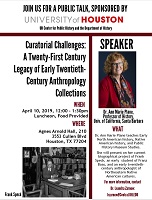 Dr. Plane’s presentation will address issues of curation and public history practice via the work of anthropologist, Frank Speck (1881-1950). Speck’s large collections of Native American artifacts now pose logistical, political, and intellectual challenges for museum curators and scholars, mostly because of sketchy documentation about their origins and the larger political implications of cultural appropriation. Dr. Plane will address the personal and professional meanings of these artifacts for Frank Speck, as well as his methodological approach for procuring and preserving the artifacts.
Dr. Plane’s presentation will address issues of curation and public history practice via the work of anthropologist, Frank Speck (1881-1950). Speck’s large collections of Native American artifacts now pose logistical, political, and intellectual challenges for museum curators and scholars, mostly because of sketchy documentation about their origins and the larger political implications of cultural appropriation. Dr. Plane will address the personal and professional meanings of these artifacts for Frank Speck, as well as his methodological approach for procuring and preserving the artifacts.
Wednesday, April 10, 2019
12:00 pm
Agnes Arnold Hall Room 210
Wednesday, 4/17, 2019: Air Politics and "Vigilant Neighbors": Forging a Discourse of Pollution Abatement in Mexico City, 1971-1988, by Ela Milijkovic (Ph.D. Candidate, UH Department of History)
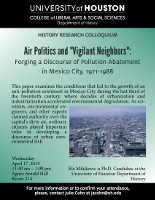 This paper examines the conditions that led to the growth of an anti-pollution sentiment in Mexico City during the last third of the twentieth century, where decades of urbanization and industrialization accelerated environmental degradation. As scientists, environmental engineers, and other experts claimed authority over the capital's dirty air, ordinary citizens played important roles in developing a discourse of urban environmental risk.
This paper examines the conditions that led to the growth of an anti-pollution sentiment in Mexico City during the last third of the twentieth century, where decades of urbanization and industrialization accelerated environmental degradation. As scientists, environmental engineers, and other experts claimed authority over the capital's dirty air, ordinary citizens played important roles in developing a discourse of urban environmental risk.
Wednesday, April 17, 2019
11:30 am - 1:00 pm
Agnes Arnold Hall Room 214
Wednesday, 4/24, 2019: Emiliano Zapata: Mexico's Social Revolutionary by Dr. Paul Hart (Texas State University)
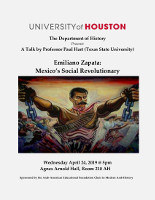 Paul Hart (PhD, UC San Diego) is Professor of History and Director of the Center for International Studies at Texas State University. His latest book is Emiliano Zapata: Mexico's Social Revolutionary (Oxford University Press, 2017). He is also the author of Bitter Harvest: The Social Transformation of Morelos, Mexico, and the Origins of the Zapatista Revolution, 1840-1910 (University of New Mexico Press, 2005) which was awarded the 2007 Harvey L. Johnson Book Award by the Southwest Council of Latin American Studies.
Paul Hart (PhD, UC San Diego) is Professor of History and Director of the Center for International Studies at Texas State University. His latest book is Emiliano Zapata: Mexico's Social Revolutionary (Oxford University Press, 2017). He is also the author of Bitter Harvest: The Social Transformation of Morelos, Mexico, and the Origins of the Zapatista Revolution, 1840-1910 (University of New Mexico Press, 2005) which was awarded the 2007 Harvey L. Johnson Book Award by the Southwest Council of Latin American Studies.
Sponsored by the Arab-American Educational Foundation Chair in Modern Arab History
Wednesday, April 24, 2019, 5:00 pm
Agnes Arnold Hall Room 210
Wednesday, 9/11, 2019: Ovid’s Handbook on Rape Culture: The Metamorphoses and the Silencing of Survivors, by Darah Vann (UH)
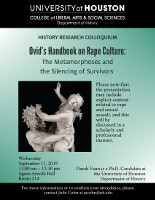 Please join us for the History Research Colloquium on Wednesday, September 11, 11 am - 12:30 pm, in AH 214. History graduate student Darah Vann will present “Ovid’s Handbook on Rape Culture: The Metamorphoses and the Silencing of Survivors.” Please note that the presentation may include explicit content related to rape and sexual assault, and this will be discussed in a scholarly and professional manner.
Please join us for the History Research Colloquium on Wednesday, September 11, 11 am - 12:30 pm, in AH 214. History graduate student Darah Vann will present “Ovid’s Handbook on Rape Culture: The Metamorphoses and the Silencing of Survivors.” Please note that the presentation may include explicit content related to rape and sexual assault, and this will be discussed in a scholarly and professional manner.
Wednesday, September 11, 2019
11:00 am - 12:30 pm
Agnes Arnold Hall Room 214
Research Article in The American Historical Review
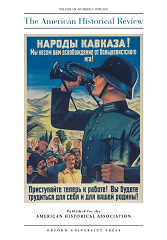 Dr. Abdel Razzaq Takriti, Associate Professor, Arab-American Educational Foundation Chair in Modern Arab History, and a leading authority on the twentieth-century history of the Middle East, published his latest research on "Colonial Coups and the War on Popular Sovereignty" in The American Historical Review (Vol. 124, Iss. 3), the official publication of the American Historical Association. From the abstract:
Dr. Abdel Razzaq Takriti, Associate Professor, Arab-American Educational Foundation Chair in Modern Arab History, and a leading authority on the twentieth-century history of the Middle East, published his latest research on "Colonial Coups and the War on Popular Sovereignty" in The American Historical Review (Vol. 124, Iss. 3), the official publication of the American Historical Association. From the abstract:
Compared to related phenomena such as revolutions, coups d’état have been undertheorized, approached in imperial and national histories as individual case studies, and analyzed by social scientists through the prism of democratization theory. This article argues that coups merit greater historical reflection, highlighting their significance in shaping sovereignty arrangements in the post–Second World War era. See the link for more details.
Members of the Department of History Honored with Teaching Excellence Awards
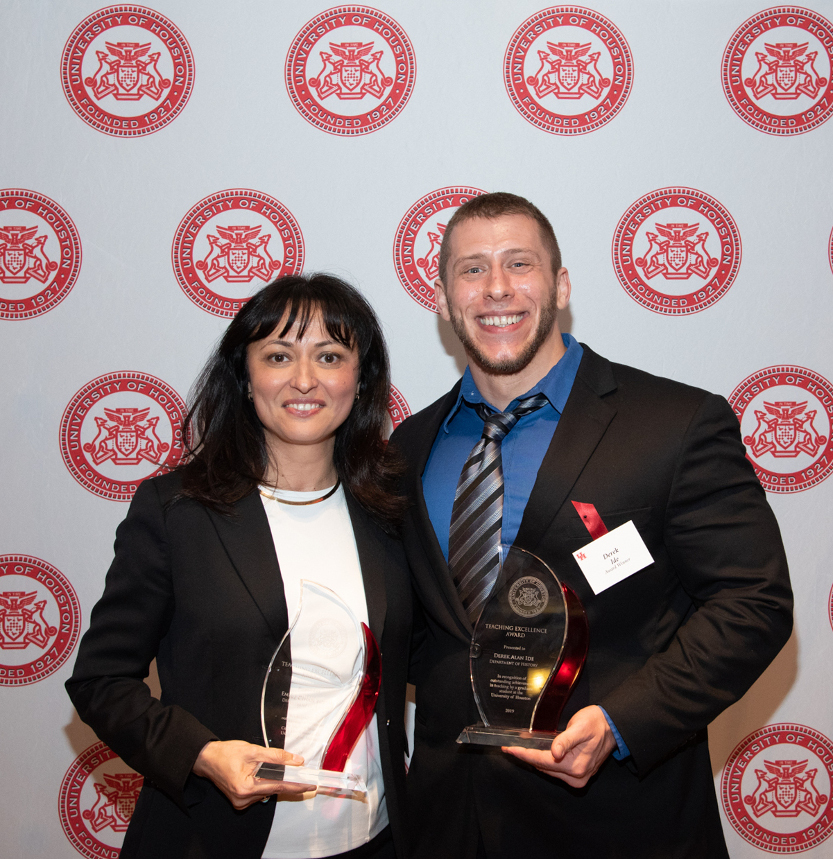 Congratulations to the members of the Department of History, Associate Professor Dr. Cihan Yüksel and PhD Candidate Derek Ide, for receiving 2019 Teaching Excellence Awards!
Congratulations to the members of the Department of History, Associate Professor Dr. Cihan Yüksel and PhD Candidate Derek Ide, for receiving 2019 Teaching Excellence Awards!
Dr. Yüksel was honored with a Provost Core Award for demonstrated excellence in teaching University Undergraduate Core Curriculum courses. Mr. Ide was honored with a Graduate Teaching Assistant Award.
For more updated feed about the events of the Department of History, follow
Thursday, 9/19, 2019: "Between History, Memoir, and Fiction: Telling the Story of the Jews of Cuba" by Dr. Ruth Behar (University of Michigan)
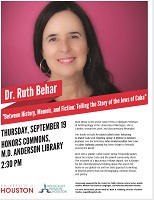 Ruth Behar is the Victor Haim Perera Collegiate Professor of Anthropology at the University of Michigan. She is a writer, researcher, poet, and documentary filmmaker. Her books include An Island Called Home: Returning to Jewish Cuba and Traveling Heavy: A Memoir in between Journeys. Her documentary Adio Kerida/Coodbye Dear Love: A Cuban Sephardic Journey has been shown in festivals around the world.
Ruth Behar is the Victor Haim Perera Collegiate Professor of Anthropology at the University of Michigan. She is a writer, researcher, poet, and documentary filmmaker. Her books include An Island Called Home: Returning to Jewish Cuba and Traveling Heavy: A Memoir in between Journeys. Her documentary Adio Kerida/Coodbye Dear Love: A Cuban Sephardic Journey has been shown in festivals around the world.
Born into a Jewish Cuban home, Behar frequently writes about her native Cuba and the Jewish community there. The recipient of a MacArthur Fellows Award, she is known for her interdisciplinary thinking about the search for home in our global era and her bold approach to writing in blurred genres that mix ethnography, memoir, fiction, and poetry.
Generously supported by the Center for Public History lecture series, Jewish Studies, Modern and Classical Languages. and Holocaust Museum Houston.
Thursday, September 19, 2019
2:30 pm
Honors Commons, M.D. Anderson Library
For more information, please email Dr. Malt A. Goldberg, Director of Jewish Studies, magoldberg@uh.edu.
Tuesday-Thursday, 9/24-26, 2019: "From behind the Barbed Wire: Uncaged Art from the Tornillo Children's Detention Center" a by Dr. Ruth Behar (University of Michigan)
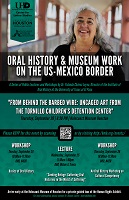 Come join the Center for Public History, the UH Downtown Center for Latino Studies, and the Holocaust Museum Houston for a series of public lectures and workshops by Dr. Yolanda Chávez Leyva on oral history and museum work on the Ciudad Juárez-El Paso border.
Come join the Center for Public History, the UH Downtown Center for Latino Studies, and the Holocaust Museum Houston for a series of public lectures and workshops by Dr. Yolanda Chávez Leyva on oral history and museum work on the Ciudad Juárez-El Paso border.
Yolanda Chávez Leyva is the Director of the Institute of Oral History at the University of Texas at El Paso and an Associate Professor in History. She was born and raised on the Ciudad Juárez-El Paso border and has dedicated her life to listening to and documenting the histories of fronterizos, border people. She specializes in border history, public & oral history, and Chicana history. She is co-founder of Museo Urbano, a museum of the streets that highlights fronterizo history by taking it where people are--from museums to the actual streets of El Paso.
Tuesday, 9/24:
10-11:30am: Oral History Workshop I: Basics of Oral History. Location: UH Downtown, N420.
Wednesday, 9/25:
11:30am-1pm: Lecture on “Seeking Refuge: Gathering Oral Histories in the Midst of Suffering.” Location: UH Downtown, Milam & Travis.
Thursday, 9/26:
10-11:30am: Oral History Workshop II: An Oral History Workshop on Cultural Competency. Location: UH Downtown, N420.
6:30pm: Lecture on “From behind the barbed wire: Uncaged Art from the Tornillo Children’s Detention Center.” Location: Holocaust Museum Houston. Please RSVP for this event at the Holocaust Museum Houston through Eventbright: https://hmh.org/events/from-behind-the-barbed-wire-uncaged-art-from-the-tornillo-2019-09-26-18:30:00.
Wednesday, 10/16, 2019: Arsinoë II and Berenike II: Ptolemaic Vanguards of Queenly Political Power by Tara Sewell-Lasater (UH)
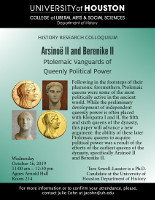 Following in the footsteps of their pharaonic foremothers, Ptolemaic queens were some of the most politically active in the ancient world. While the preliminary development of independent queenly power is often placed with Kleopatra I and II, the fifth and sixth queens of the dynasty, this paper will advance a new argument: the ability of these later Ptolemaic queens to acquire political power was a result of the efforts of the earliest queens of the dynasty, specifically Arsinoë II and Berenike II.
Following in the footsteps of their pharaonic foremothers, Ptolemaic queens were some of the most politically active in the ancient world. While the preliminary development of independent queenly power is often placed with Kleopatra I and II, the fifth and sixth queens of the dynasty, this paper will advance a new argument: the ability of these later Ptolemaic queens to acquire political power was a result of the efforts of the earliest queens of the dynasty, specifically Arsinoë II and Berenike II.
Wednesday, October 16, 2019
11:00 am - 12:30 pm
Agnes Arnold Room 214
Wednesday, 11/6, 2019: "Queuetopia: The Phantasmagoria of Everyday Consumption in Late Soviet Culture" by Dr. Andrew Chapman (University of Texas at San Antonio)
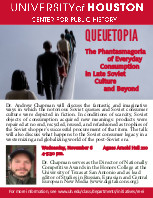 Dr. Chapman will discuss the fantastic, absurd, and imaginative ways in which the notorious Soviet queues, in particular, and Soviet consumer culture, in general, were depicted in fiction. Beginning in the late socialist period, the talk extends into the present day and discusses humorous wordplay between the Russian language and the arrival of foreign-branded consumer products.
Dr. Chapman will discuss the fantastic, absurd, and imaginative ways in which the notorious Soviet queues, in particular, and Soviet consumer culture, in general, were depicted in fiction. Beginning in the late socialist period, the talk extends into the present day and discusses humorous wordplay between the Russian language and the arrival of foreign-branded consumer products.
Wednesday, November 6, 2019, 4 - 5:30 pm
Agnes Arnold Room 210.
Monday, 11/11, 2019: Book Launch: Ideologies of Race: Imperial Russia and the Soviet Union in Global Context, edited by David Rainbow (UH).
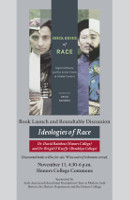 Drs. David Rainbow and Alexey Golubev (UH) and Dr. Brigid O'Keeffe will discuss a new edited volume edited by Dr. Rainbow, Ideologies of Race: Imperial Russia and the Soviet Union in Global Context (Montreal: McGill-Queen's University Press, 2019). The book reevaluates the meaning of race in Russia and the Soviet Union by bringing together historians, literary scholars, and anthropologists of Russia, the Soviet Union, Western Europe, the United States, the Caribbean, and Latin America. The essays shift the principle question from whether race meant the same thing in the region as it did in the "classic" racialized regimes such as Nazi Germany and the United States, to how race worked in Russia and the Soviet Union during various periods in time. The collection yields crucial insights into the global history of race and its ongoing effects in the contemporary world.
Drs. David Rainbow and Alexey Golubev (UH) and Dr. Brigid O'Keeffe will discuss a new edited volume edited by Dr. Rainbow, Ideologies of Race: Imperial Russia and the Soviet Union in Global Context (Montreal: McGill-Queen's University Press, 2019). The book reevaluates the meaning of race in Russia and the Soviet Union by bringing together historians, literary scholars, and anthropologists of Russia, the Soviet Union, Western Europe, the United States, the Caribbean, and Latin America. The essays shift the principle question from whether race meant the same thing in the region as it did in the "classic" racialized regimes such as Nazi Germany and the United States, to how race worked in Russia and the Soviet Union during various periods in time. The collection yields crucial insights into the global history of race and its ongoing effects in the contemporary world.
Monday, November 11, 2019, 4:30 - 6 pm.
Location: Honors Commons, Honors College, University of Houston.
Tuesday, 11/12, 2019: "A Lebanese October Revolution: Reclaiming Public Spaces, Rejecting Patriarchy, and Demanding Social Justice" by Dr. Sana Tannoury-Karam (Arab Council for the Social Sciences & Lebanese American University)
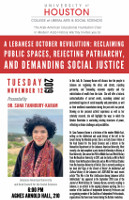 In this talk, Dr. Tannoury-Karam will discuss how the people in Lebanon are reclaiming the cities and streets, rejecting patriarchy, and demanding economic equality and the redistribution of wealth from the state. She will offer a historic contextualization of current events, examining colonial and postcolonial legacies of social inequality and paternalism, as well as their neoliberal exacerbation during the post-civil war period. Drawing on her personal activist experience as well as her scholarly research, she will highlight the ways in which the October Revolution is contesting existing structures of power, reflecting on future challenges and possibilities.
In this talk, Dr. Tannoury-Karam will discuss how the people in Lebanon are reclaiming the cities and streets, rejecting patriarchy, and demanding economic equality and the redistribution of wealth from the state. She will offer a historic contextualization of current events, examining colonial and postcolonial legacies of social inequality and paternalism, as well as their neoliberal exacerbation during the post-civil war period. Drawing on her personal activist experience as well as her scholarly research, she will highlight the ways in which the October Revolution is contesting existing structures of power, reflecting on future challenges and possibilities.
Tuesday, November 12, 2019, 6 - 8 pm.
Agnes Arnold Room 210.
Wednesday, 11/13, 2019: "Through Texas into Mexico": Sunbelt Pan Americanism and Gendered Liberalism in the Alliance of Pan American Round Tables, 1944-1964 by Albeto Wilson (UH)
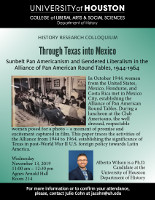 In October 1944, women from the United States, Mexico, Honduras, and Costa Rica met in Mexico City, establishing the Alliance of Pan American Round Tables. During a luncheon at the Club Americano, the well dressed, respectable women posed for a photo – a moment of promise and excitement captured in film. This paper traces the activities of the Alliance from 1944 to 1964, establishing the significance of Texas in post-World War II foreign policy towards Latin America.
In October 1944, women from the United States, Mexico, Honduras, and Costa Rica met in Mexico City, establishing the Alliance of Pan American Round Tables. During a luncheon at the Club Americano, the well dressed, respectable women posed for a photo – a moment of promise and excitement captured in film. This paper traces the activities of the Alliance from 1944 to 1964, establishing the significance of Texas in post-World War II foreign policy towards Latin America.
Wednesday, November 13, 2019
11:00 am - 12:30 pm
Agnes Arnold Room 214
For more information or to confirm your attendance, please contact Julie Cohn at jacohn@uh.edu.
Wednesday, 11/20, 2019: "Iraq Afterwards: Epistemic Violence and Poetic (In)Justice" by Dr. Sinan Antoon (New York University)
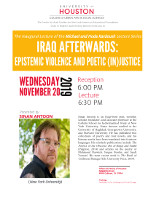 Sinan Antoon is an Iraqi-born poet, novelist, scholar, and translator. He studied at Baghdad, Georgetown, and Harvard. He has published two collections of poetry and four novels. His most recent work is The Book of Collateral Damage (Yale University Press, 2019). His literary works have been translated to fourteen languages. His translations include In the Presence of Absence by Mahmoud Darwish, which won the American Literary Translators Association Prize. Antoon’s translation of his own novel, The Corpse Washer, won the 2014 Saif Ghobash Prize for Literary Translation. His scholarly works include The Poetics of the Obscene: Ibn al-Hajjaj and Sukhf (Palgrave, 2014) and articles on the poetry of Mahmoud, Darwish, Sargon Boulus, and Saadi Youssef. His op-eds have appeared in The Guardian, The New York Times and many pan-Arab newspapers and journals. In 2003 Antoon returned to his native Baghdad to co-produce About Baghdad, a documentary about the lives of Iraqis under occupation. He is co-founder and co-editor of Jadaliyya and associate professor at New York University.
Sinan Antoon is an Iraqi-born poet, novelist, scholar, and translator. He studied at Baghdad, Georgetown, and Harvard. He has published two collections of poetry and four novels. His most recent work is The Book of Collateral Damage (Yale University Press, 2019). His literary works have been translated to fourteen languages. His translations include In the Presence of Absence by Mahmoud Darwish, which won the American Literary Translators Association Prize. Antoon’s translation of his own novel, The Corpse Washer, won the 2014 Saif Ghobash Prize for Literary Translation. His scholarly works include The Poetics of the Obscene: Ibn al-Hajjaj and Sukhf (Palgrave, 2014) and articles on the poetry of Mahmoud, Darwish, Sargon Boulus, and Saadi Youssef. His op-eds have appeared in The Guardian, The New York Times and many pan-Arab newspapers and journals. In 2003 Antoon returned to his native Baghdad to co-produce About Baghdad, a documentary about the lives of Iraqis under occupation. He is co-founder and co-editor of Jadaliyya and associate professor at New York University.
Wednesday, November 20, 2019. Wine and Cheese Reception @ 6 pm, Lecture @ 6:30.
Hilton Hotel, University of Houston, Conrad Ballroom.
Thursday, 11/21, 2019: "Iraq Afterwards: Epistemic Violence and Poetic (In)Justice" by Dr. Sinan Antoon (New York University)
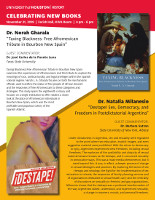 Book launch event of Dr. Norah Gharala's Taxing Blackness: Free Afromexican Tribute in Bourbon New Spain (University of Alabama Press, 2019) and Dr. Natalia Milanesio's Destape! Sex, Democracy, and Freedom in Postdictatorial Argentina (University of Pittsburgh Press, 2019).
Book launch event of Dr. Norah Gharala's Taxing Blackness: Free Afromexican Tribute in Bourbon New Spain (University of Alabama Press, 2019) and Dr. Natalia Milanesio's Destape! Sex, Democracy, and Freedom in Postdictatorial Argentina (University of Pittsburgh Press, 2019).
Guest commentators: Dr. José Carlos de la Puente Luna, Texas State University, and Dr. Barbara Sutton, State University of New York, Albany.
Thursday, November 21, 2019, 4 pm.
Farish Hall, KIVA Room.
New Book by Abdel Razzaq Takriti
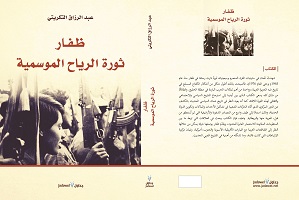 Abdel Razzaq Takriti, Zufar: Thawrat al-Riyah al-Mawsiymya [Dhufar: The Monsoon Revolution] (Jadawel, 2019).
Abdel Razzaq Takriti, Zufar: Thawrat al-Riyah al-Mawsiymya [Dhufar: The Monsoon Revolution] (Jadawel, 2019).
The book is based on an expanded and substantially revised translation of Pro-fessor Takriti’s widely acclaimed English-language volume Monsoon Revolution: Republicans, Sultans, and Empires in Oman (Oxford University Press, 2013; revised paperback edition 2016). Grounded in extensive archival and oral history research, the book offers a new model for studying Arab revolu-tions, globalizing the history of the Dhufar revolution in Oman (1965–76), which was the longest running major armed struggle in the history of the Ara-bian Peninsula, Britain’s last classic colonial war in the region, and one of the highlights of the Cold War in the Middle East.
Professor Frank Holt in the News!
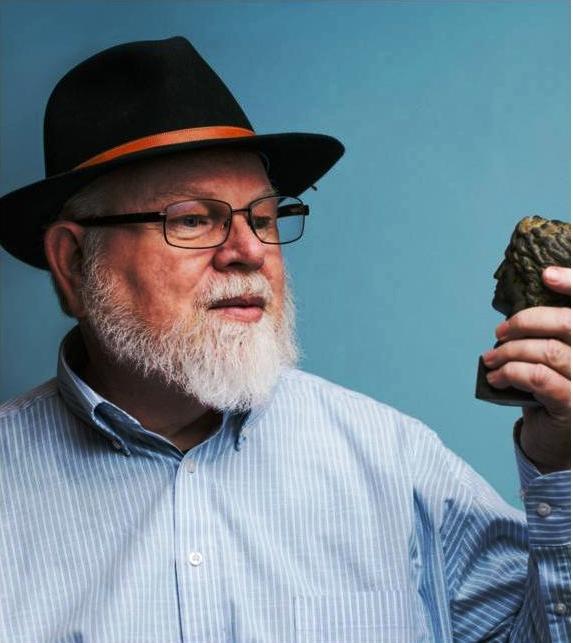
“These coins didn’t really need marks of value because their worth was the weight in gold or silver. Mints increased the amount of messaging by imprinting both sides. That’s why we as historians get so excited,” said Holt, who is recognized as one of the world’s leading authorities on Alexander the Great, Hellenistic Asia and the study or collection of currency, including coins. He likes to say he didn’t go into history for the money. He went into money for the history. But history – and how we study it – are always evolving.